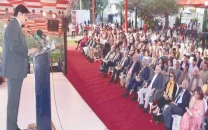AI and tech rivalry take centre stage in Lisbon
Web Summit highlights startups, quantum computing, and self-driving cars

Hollywood-style excitement mingled with cutting-edge technology at Lisbon's annual Web Summit this week, where global tech leaders, startups, and investors gathered to explore artificial intelligence, robotics, and autonomous vehicles, all under the shadow of escalating US-China tensions.
Over four days, the "Davos for geeks" is expected to host more than 70,000 visitors from 150 countries, including 2,500 startups and 1,000 investors. Attendees explored colourful stands highlighting humanoid robots, quantum computing innovations, and AI-driven 3D printers, illustrating how artificial intelligence is moving from abstract software into the physical world.
Microsoft dominated headlines with a $10-billion AI data centre project in Portugal in partnership with British firm Nscale, described as "one of the largest investments in AI computing capacity in Europe."
Nvidia executives underscored concerns about China's tech dominance, warning that the country's engineers are rapidly advancing in AI despite export restrictions on high-end chips. Web Summit founder Paddy Cosgrave noted that "the era of Western tech dominance is fading."
Autonomous vehicles were a major focus, with ride-hailing giants Uber and Lyft presenting a gradual path for self-driving cars. Uber's operations chief Andrew Macdonald said that while technology to outperform human drivers is "largely solved," commercialisation remains a challenge.
Lyft chief David Risher projected that even achieving 10% of rides autonomously within five years would be a major success. Both companies emphasised that human drivers will continue operating most rides in the near future to provide safety, assistance, and personal service.
Partnerships bridging the US-China divide were highlighted in the autonomous vehicle sector. Lyft is collaborating with Chinese firm Baidu in Germany and the UK, and Uber is working with China's WeRide in the Gulf alongside partnerships with Waymo in US cities. Such collaborations contrast with the fierce competition in AI and semiconductor industries, reflecting a more pragmatic, market-specific approach.
The summit also showcased emerging AI applications. Swedish firm Lovable demonstrated platforms allowing users to create apps and websites via chatbots without coding, producing 100,000 new products daily.
Qualcomm unveiled AI chips poised to challenge Nvidia and AMD, while Chinese manufacturers like Unitree and Bambulab demonstrated humanoid robots and AI-powered 3D printing.
Amid the technology showcases, European Commission digital chief Henna Virkkunen stressed the EU's push for technological sovereignty, calling for public procurement rules that favour European AI startups and reduce dependence on a single country. Meanwhile, gaming platform Roblox outlined its measures to verify underage users, highlighting ongoing regulatory scrutiny in the sector.
From AI to autonomous vehicles, Lisbon's Web Summit has become a crossroads of innovation, investment, and geopolitical tension - a showcase of how technology, business, and media intersect in an increasingly competitive global landscape.





















COMMENTS
Comments are moderated and generally will be posted if they are on-topic and not abusive.
For more information, please see our Comments FAQ